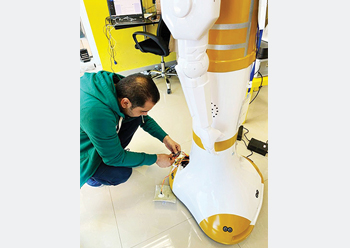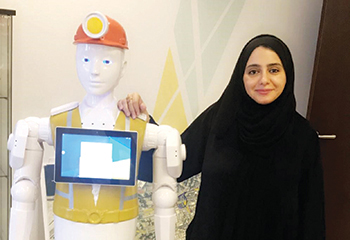Made-in-UAE robot to help ministry
01 January 2019
The UAE’s Ministry of Infrastructure Development (MOID) hopes to see the adoption of artificial intelligence (AI) in the construction industry at some point in time, but there are still many challenges that need to be overcome and apprehensions that need to be addressed.
The ministry is currently leading the way to show various stakeholders how AI can change things for the better. Its AI team initiative is being led by an energetic female engineer, Anwaar Al Shimmari, chief innovation officer and director of Design at MOID, headed by Dr Abdullah Belhaif Al Nuaimi.
She says AI can be helpful in generating solutions using big data that the human brain cannot process. It can also aid in producing thousands of concepts in government organisations very quickly compared to when done by humans. This, she adds, will make projects more efficient and help in achieving user satisfaction, which is what the government aims for.
 |
|
The team has reached the initiation stage of the project. |
Speaking to Oscar Wendel in an exclusive interview for Gulf Construction, Al Shimmari says the MOID is currently building a robot that will be used to help on projects – from planning, design and execution up to operations and maintenance. Around 50 programmers and professionals under the the specialised company “International Group for Innovative Solutions GIS” have been contracted by the ministry for the job. This 100-per-cent ‘made-in-UAE machine’ will be fed with data from projects in all stages. It will then automate processes by taking into consideration optimum scenarios and create comparisons with the best international standards and guidelines. This will eliminate the risk of error and improve decision-making. The robot, after reading and engaging with these projects, will start analysing and processing the requirements to provide optimum scenarios and alert engineers of any anticipated risk or undesired outcome.
“And then we start eliminating these deficiencies,” says Al Shimmari. “The more you feed the robot with data, the more it can analyse, create analytics, process information, and then the algorithms work much more efficiently. We can then estimate if these projects are in the right location, at the right time, if the cash flow is happening as planned, and if the execution plan is going through smoothly, and so on.”
Al Shimmari clarifies that the robot will not visit the construction site, but rather will be located in an office. At this stage, the mould for the machine has been completed and it’s all moving and operating.
“We have reached the initiation stage of the project. The team and relevant departments are meeting weekly to make sure we have the process automated and programmed into the robot brain. We will then feed the ‘brain’ with projects (both buildings and roads) under the initiation stage.”
Speaking of data for the robot, Al Shimmari says building information modelling (BIM) will be one of the feeding sources.
MOID is sharing all this research with the International Symposium of Automation and Robotics in Construction (ISARC), of which the UAE became a member of 2018, making it the first Arab country from the Middle East and North Africa (Mena) region to join the association.
A highlight of robots, Al Shimmari says, is the way they help in taking decisions when compared to humans. A robot will base its analysis for optimum decisions on best practices and consider all the outcomes and variables present today to better forecast what might happen in the future.
“But even when the robot gives me an answer, I still have the role and responsibility to take the right decision,” says Al Shimmari, implying that humans will still be crucial in the decision-making process.
“However, if I make a different decision from the recommendation given to me by the robot, it will register this decision and update the calculation with this new input. Robots will not take the burden of decision-making or force me to make a specific decision. Instead, it will help me make better decisions.” she adds.
Turning to the adoption of AI in the construction industry, Al Shimmari says the industry is getting more mature. In fact, when changes are happening all around, they will influence everyone, and it is only a matter of time before these technologies are introduced widely.
“I believe this will start very soon,” she says, adding, however, that a challenge the construction industry faces with AI is the cost and level of knowledge in the field.
“It’s a new technology. The adoption of this change is hard when it comes to big companies. Most of the construction workforce consists of people with a specific background and expertise. It’s not easy to change culture and replace processes and technologies while you’re developing something else. I believe technology is the greatest player in artificial intelligence if the people are ready to implement the change, else, it’s a challenge for everyone.”
The concerns of people in the sector are regarding AI’s impact on the human role in construction. Al Shimmari, however, says we have to evolve. “People will have to be trained to do the AI programming and managing it. But if you stay in your comfort zone and your mindset remains the same, then AI will definitely take over your job.
“So while AI is developing, we have to develop alongside to reach a point where we are in charge of this new technology and this technology does not overtake our exclusivity as experts in the field.”
Elaborating further on the use of AI, Al Shimmari cites the example of carbon dioxide (CO2) emissions restrictions: “Imagine if CO2 emissions restrictions became compulsory for construction. You then as a company will have to reduce CO2 emissions to the required cap. With AI, you will have all the options on the table, and can then make the right decision based on the outcomes that you think are right. Over the last couple of decades, we have seen dramatic changes in how environmental considerations have impacted technology in construction.”
So AI will assist in decision-making and making the job execution easier, just like other forms of technologies have, such as 3D printing and robotic arms.
Al Shimmari explains: “Like 3D printing, it assists you to do a project differently, or helps to minimise the time and resources on the job, although it may increase the budget. So if I have a sufficient budget but have minimal time, and I need a very professional outcome, then I will definitely go for 3D printing. It depends on the scale of the project itself as well. It’s like a matrix where the more knowledge you have about these technologies, the better outcomes you can create according to your requirements.”
“However, coming back to robotics, there is the robotic arm, for example. It’s a technology that’s either minimising the time spent on construction or reducing the number of workers on site. So companies that want to use robotic arms to reduce the number of workers on site can go for this technology.”
Al Shimmari says contrary to construction, industries such as energy, medicine, and healthcare are making strides forward and taking the initiative and changing how things are being done.
The MOID will work with partners, including consultants, contractors and suppliers, on the AI initiative for mutual benefit.
Al Shimmari says when the MOID wanted to start its AI initiative, it had only three offers at that time. Now it has been contacted by 12 companies, with some of them having recently opened branches in the UAE as well.
“So things develop when there is a need in the market. For example, in 2015, when the government announced the innovation strategy, there was not a single professional innovation training course in any training company. Now you see hundreds of programmes and training courses available in and outside the UAE. In fact, students and employees from other countries now come here for training, and so now you have developed a new market.
“So, AI is not only developing a new market but also opening doors for markets that we were not expecting, or were not even previously available. Most of the AI companies that are experts in the field were either from Silicon Valley, Palo Alto, San Francisco or Scandinavia,” adds Al Shimmari.
She says the MOID has worked with a Swedish company called Innovation 360, where she is a licensed practitioner, to benchmark the ministry among 6,000 companies worldwide. This firm develops exciting courses and even has its own patented software related to ideation.
Al Shimmari, who has headed the AI initiative since March 2018, has a bachelor’s in architectural engineering and two master’s degrees in urban planning and transportation planning, in addition to a diploma from Cambridge in innovation, and an executive leadership diploma from Oxford. She is also a certified Innovation Leader from AIPMM.
Her innovation team comprises nine people, but the work cascades down to every single employee in the ministry. “For example, a while back we sent an e-mail to all employees in the ministry (around 500) to provide innovative ideas that could be implemented. These brainstorming sessions to come up with innovation tools are compulsory. The aim is to come up with innovative ideas that are then evaluated to see if we can apply them. We then start the scheduling, budgeting, and implementation plan of these ideas,” she explains.
The UAE is keen on investing in innovation and technology. In fact, every government entity has appointed a chief innovation officer, a role mandated in all federal entities by His Highness Sheikh Mohammed bin Rashid Al Maktoum, the Vice President and Prime Minister of the UAE, and Ruler of Dubai.
* Anwaar Al Shimmari was speaking on the sidelines of the International Conference for Sustainable Construction Materials held in Dubai, UAE, in November.
- New trends ‘massively transformative’
- Made-in-UAE robot to help ministry
- Taking the leap into next frontier of FM



